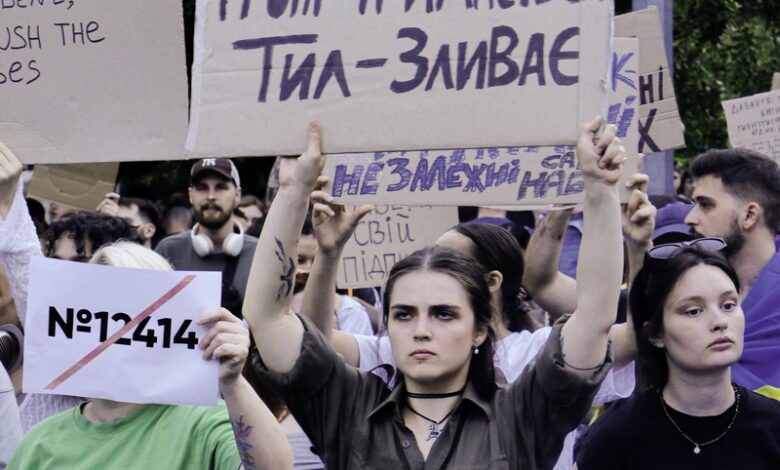The Public Oversight Council at NABU and the public opposed the law that eliminates the independence of anti-corruption bodies

On July 22, 2025, the Verkhovna Rada supported the scandalous bill No. 12414, which amends the Criminal Code, but the content is much more. The document adopted by the parliament provides for a significant strengthening of the powers of the Prosecutor General and a significant limitation of the functions of the National Anti-Corruption Bureau of Ukraine and the Specialized Anti-Corruption Prosecutor’s Office. The reaction to this did not take long: the Council of Public Control under NABU published an open appeal to the president, and protest actions were held in Ukrainian cities.
Statement of the Council of Public Control at NABU
The Council of Public Control at NABU stated about the inadmissibility of signing this draft law and called on the President of Ukraine to prevent its entry into force. The appeal refers to a serious threat to the independence of the anti-corruption system created after the Revolution of Dignity with the support of international partners. According to the Council, the document paves the way for the direct intervention of the Office of the Prosecutor General in the work of the NABU and SAP — up to the unilateral closure of proceedings, in particular, regarding top officials.
The position expressed by the Council of Public Control under NABU was voiced in conditions when alarming processes in the anti-corruption sphere intensified in Ukraine. These events testify to a dangerous trend — the successive curtailment of the independence of bodies called to investigate corruption at the highest levels. In particular, it is about large-scale searches that were conducted against NABU detectives. The initiators of these actions were several law enforcement agencies — the Security Service of Ukraine, the State Bureau of Investigation, and the Prosecutor General’s Office. At the same time, an unscheduled inspection was launched in the Bureau itself to ensure the state secret preservation regime.
On July 21, a large-scale wave of searches took place: law enforcement agencies conducted more than seventy investigative actions that affected NABU employees. Searches were conducted not only in office premises, but also in residences. According to official information provided by the Bureau itself, all these measures took place without the corresponding decisions of investigative judges. At the same time, the reasons for the searches were extremely varied and did not have a systematic nature: both old traffic accidents and unspoken suspicions of possible connections of individual detectives with the aggressor state appeared. One of the employees of NABU reported that employees of the Security Service of Ukraine used physical force on him, although he did not offer any resistance.
Commenting on the situation, Anton Shvets, head of the Council of Public Control at NABU, emphasized:
“We consider it unacceptable to use law enforcement tools to influence the work of NABU and SAP. Their independence is not only a matter of domestic politics, but also of Ukraine’s international obligations.”
At the same time, the Verkhovna Rada adopted draft law No. 12414, which contains changes that, according to the conclusions of human rights defenders and representatives of the anti-corruption community, may give the Prosecutor General excessive influence over the activities of independent bodies — NABU and SAP. In particular, the law provides for the possibility of removing cases from the jurisdiction of the NABU, influence on the prosecutors of the Specialized Anti-Corruption Prosecutor’s Office, the right to issue mandatory written instructions to the Bureau’s detectives, as well as the authority to unilaterally close criminal proceedings, even those involving high-level officials.
The independence of the SAP will also suffer a blow: according to the provisions of the law, the prosecutors of this body may lose the authority to determine the responsibility of NABU in exceptional cases. In addition, the head of the Specialized Anti-Corruption Prosecutor’s Office may be deprived of the opportunity to resolve disputes regarding the jurisdiction of cases, as well as to change submitted appeals or cassation complaints.
In a statement published by the Public Control Council on its page, it is emphasized:
“NABU and SAP were created, with the support of international partners, as independent institutions protected from political influence, and that is exactly what they should remain.”
At the same time, representatives of civil society, in particular members of the Council of Public Control under NABU, warn: if the president of Ukraine does sign this law, it will pose a serious threat to the system of checks and balances that has guaranteed the institutional independence of anti-corruption bodies since their creation after the Revolution of Dignity.
Protest as a last argument
On the same day, July 22, several hundred citizens gathered near the Ivan Franko Theater in Kyiv. People took to the streets to express strong protest against the law passed by the parliament. In their hands, the protesters held placards with the inscriptions: “Money does not like silence”, “People’s anger is worse than NABU and SAP”, “No to the destruction of the anti-corruption system”, “Veto on the law”, “Return Europe”, “Shame”. These slogans conveyed the essence of frustration and anger that had accumulated in society.
Among those present were military personnel, veterans, and representatives of public organizations. Dmytro Kozyatinsky, a military serviceman from the “Ulf” medical service, became one of the organizers of the action. He emphasized:
“This draft law destroys all the anti-corruption achievements of Ukraine in 2015. I did not fight for our powerful people to accept this now.”
When asked what he expects, Kozyatinsky answered without hesitation:
“I expect Mr. President to veto this draft law.”
The Kyiv action was not the only one, similar gatherings took place in other cities of Ukraine. People left because they understood: it is about the destruction of the key mechanisms of curbing corruption, which Ukraine has been building for more than ten years.





